- Home
- Bonnie Bryant
May Goes to England (Pony Tails Book 11)
May Goes to England (Pony Tails Book 11) Read online
May Goes to England
Pony Tails, Book Eleven
Bonnie Bryant
I would like to give my special thanks
to Helen Geraghty for her help
in the writing of this book.
,
1 A Poem About Piskies
“I don’t want to hear another word about piskies,” May said grumpily.
“But they sound so cool,” Jasmine said.
“Piskies are not cool,” May said. “They’re pesky.”
May’s family, the Grovers, were about to go to Cornwall, England. According to May’s older sisters, Dottie and Ellie, Cornwall was loaded with piskies, who hated little girls.
‘“Piskies are invisible people,” Jasmine read from the guidebook that Dottie and Ellie had given May. “‘They sit on mushrooms, which are called pisky stools. They love to tease people.’” Jasmine looked up with a grin. “Especially people who are messy.”
“What a surprise!” May said. For weeks Dottie and Ellie had been telling her that the piskies of Cornwall were going to make her life miserable.
“There’s a poem about piskies,” Jasmine said.
“See-saw, Margery Daw,
Sold her bed and lay on the straw,
Sold her bed and lay upon hay,
Pisky came and took her away.”
May looked around her room. It was messier than usual because she was packing for the trip. But then, it was always kind of messy. May didn’t really believe that there were such things as piskies who took messy people away. On the other hand, when she got to Cornwall, maybe she should be extra neat, just in case.
“There are giants, too,” Jasmine said, looking at the book. “They eat people who get lost on the moor.”
“What’s a moor?” Corey said.
Jasmine looked in the book. “A wet, soggy wasteland with no houses or trees. Travelers often get lost there.”
“Cornwall sounds like an ideal vacation spot,” said Corey with a laugh.
“Hey, the moor is full of ponies,” May said. “The ponies have been living there hundreds of years. By the next time you see me, I’ll be a wild pony expert.” May was trying to look on the bright side of things. When she’d first heard that her family would be exchanging houses with a farm family in Cornwall, she had been excited. But since Dottie and Ellie had started telling her about piskies, she had her doubts.
“It says here that the moor is filled with huge stone toothpicks,” said Jasmine, looking at the guidebook. “Giants use them to clean their teeth.”
“Yeah, a giant wouldn’t want a human to get stuck in his teeth,” Corey said.
“Can we talk about something else?” May said.
“Totally,” Jasmine said. “We’ll talk about pirates.” She turned a page. “It says here that pirates used to build fake lighthouses. Ships would steer toward them and crash on the rocks and the pirates would rob them.”
“My father says that Cornwall is completely safe,” May said. “He says that there aren’t any more pirates in Cornwall and that giants and piskies are imaginary.”
“Then you’ll have a great time,” said Jasmine, shutting the book. “Just don’t go wandering around the moor when the moon is full. That’s when the giants and piskies come out.”
“Gee, thanks,” May said.
Mrs. Grover stuck her head into May’s room. “Are you done packing?” she asked May. “We’ll be loading the car soon.”
“I’m done,” May said.
As soon as Mrs. Grover left, Corey and Jasmine looked in May’s suitcase.
“Aren’t you forgetting something?” Jasmine asked.
May checked her suitcase. In addition to her regular clothes, she had a pair of riding boots, two pairs of breeches, and her riding helmet. “What else is there?” she asked.
“A hairbrush?” Jasmine said.
“Details,” May muttered. She went into the bathroom to get her hairbrush. Then she saw her toothbrush. That would be handy, too, she realized. And then there was toothpaste. Two weeks without toothpaste would be awful. She reached under the sink and found a plastic traveling bag and packed all her toiletries inside.
She came back into her bedroom and plunked the bag into the corner of her suitcase. “That’s it.” She closed the suitcase and zipped it. Suddenly she realized that she was really, truly leaving home.
“I’m going to miss you guys,” she said.
Corey hugged her. “You’ll write.”
“Right,” May said. “I’ll definitely write.” She sighed. “If only I were going on this trip with you guys, and not my evil sisters.”
“You’ll survive,” Jasmine said.
“Ha,” said May.
The three of them hugged. It was a big Pony Tail hug. The Pony Tails weren’t a club; they were best friends and next-door neighbors. It was hard for May to imagine two weeks away from Corey and Jasmine. It would be even harder to be away from her pony.
“What about Macaroni?” said May. Macaroni was her pony.
“He’ll be fine,” Jasmine said. “We’ll visit him every day. Twice a day.”
“Three times a day,” Corey said.
“He’ll get plenty of exercise. The farmer’s son will ride him,” Jasmine said.
“I’m really glad the family from Cornwall will be staying in our house while we stay in theirs,” May said. “And I’m really glad they have a son who wants to ride Macaroni. But there’s something creepy I didn’t tell you.”
Jasmine’s and Corey’s eyes widened. “What?” said Corey.
“His name,” May said. “You know what it is?”
Corey and Jasmine shook their heads.
“Wilfred,” said May. “Isn’t that weird?”
2 A Pony Named Cheddar
“Merry Meeting! What kind of name is that?” said Ellie, reading the name of the tiny town in Cornwall they were driving into. It was the Grover family’s third day in England, and they were exploring the countryside.
“Merry Meeting, ha!” Dottie said. “Miserable Meeting is more like it.”
“Where do they get these stupid names?” said Ellie. “Cheesewring. Washaway. The Devil’s Frying Pan. What’s their problem?”
“Cornwall has been around for a long time,” Mr. Grover said. “Those names are hundreds of years old.”
“How come I’m not surprised?” Ellie said glumly. “This place is as much fun as a museum.”
After tormenting May about how much she would hate Cornwall, Dottie and Ellie were the ones who hated it. To their horror, they had discovered that Cornwall had no shopping mall. It didn’t have a radio station that played rock and roll. Dottie and Ellie were in despair.
“Too bad the farmhouse doesn’t have TV,” said May. “But that’s okay. You can listen to old Cornish songs on the radio.”
Ellie slumped in the backseat. “This is going to be the longest two weeks of my life.”
“Cheer up,” May said. “I hear there’s folk dancing on the village green.”
Dottie looked as if she was about to faint.
May, on the other hand, was having a great time. She had been a little nervous about coming to Cornwall, but now she liked it. The farmhouse was a big old rambling stone building with something called a cheese safe. At first May thought it was to keep cheese from being stolen. But then she found out that it was a place to keep cheese cool. The house also had a chicken coop, where May gathered fresh eggs for breakfast. For dinner they had meat pies called pasties. Mrs. Grover said they were pronounced pass-tees. They were golden brown and delicious. Best of all, the farm had ponies and horses.
There were three ponies, and her father had t
old her that she could ride any one she wanted. Her favorite was Cheddar, the pony who belonged to the farmer’s son. Cheddar was named after cheddar cheese, which is very popular in England. The pony wasn’t the color of cheese. He was actually a dark bay. But he had the personality of cheddar cheese—he was bold and sharp. That made him a nice contrast to her own pony, Macaroni, who was mellow and sweet. In her first letter to Corey and Jasmine, May said that at last she had found the ideal combination of ponies: Cheddar and Macaroni—in other words, macaroni and cheese.
“What do they do for fun here?” asked Ellie. “Or maybe they don’t have fun.”
Mr. Grover said, “They go for walks on the moor. They ride.”
“Fabulous,” Ellie groaned.
“I know a place you’d like,” May said. “The Bodmin Gaol Museum.” When Ellie didn’t answer, May explained, “Gaol is English for jail. It’s spelled g-a-o-l, but you pronounce it j-a-i-l. They have a real, true dungeon in the museum.” She said to Mr. Grover, “Why don’t we drop Dottie and Ellie off there?”
Mr. Grover didn’t say anything, but May saw that he was grinning. Ever since the Grovers had arrived in Cornwall, Dottie and Ellie had been driving everyone crazy.
“They could put them in leg irons,” said May helpfully.
“That’s enough, May,” said Mr. Grover.
“I bet the piskies have seen the hideous mess May made of her room,” Dottie said.
May thought of her room at the farmhouse. It wasn’t really messy. It was just … cluttered. She had meant to clean it up, but she had been too busy. She decided that as soon as she got back to the farm she’d turn it into the neatest room on earth.
“Piskies love to torture little girls,” Ellie said.
“Who’s little?” May muttered.
“They’re waiting until midnight of the first full moon, and then they’re going to get you,” Dottie said.
“Personally, at midnight I’m planning to be asleep,” May said.
“Just wait,” said Ellie.
“Girls!” Mrs. Grover said. She sounded annoyed.
Mr. Grover steered over the top of the hill. It still amazed May that he had to drive on the left. He drove past a lorry (a truck) on the right and into the courtyard of the farmhouse.
The Grovers got out and stretched. Mr. Grover turned to May and said, “After sitting all day, I wouldn’t mind a ride.”
“Great idea,” May said. At home her father was usually busy training horses. But here he had plenty of time to ride with her.
May raced into the house and up the stairs to change. She loved her room here. It had a slanting ceiling, a huge wooden trunk that looked like a pirate chest, and a chair that was shaped like a triangle. Most important, it had lots of pony posters. Wilfred, the boy who lived here, might have a creepy name, but he certainly loved ponies. May’s favorite poster was of a dark bay pony running across the moor, his mane and tail blowing back in the wind.
May dumped her clothes on the floor and looked around for her riding gear. Her breeches were next to the wastebasket, her shirt was on the window seat, and her riding hat was on top of the chest. But where were her riding boots? She distinctly remembered stepping out of them and leaving them in the middle of the floor.
She was about to go downstairs and ask her mother if she’d seen the boots, when she noticed the closet door.
Fat chance that she might have put her boots in the closet. She decided to look anyway.
The boots were inside, standing neatly next to each other.
Never in her life had May left her boots standing neatly next to each other.
What did this mean? For a second May had the creeps. Her mother wouldn’t have put the boots in the closet because she insisted that May had to put away her own clothes. Could it have been Dottie and Ellie? This seemed to be too clever a prank for them.
Could it have been piskies? According to Dottie and Ellie, this was just the kind of thing that piskies did. They loved to make people nervous.
But piskies aren’t real, May told herself.
“May,” came Mr. Grover’s voice from outside.
“Coming,” May called out the window. She pulled on the boots and ran downstairs.
Her father was already sitting on Spock, the farmer’s big bay horse.
“Is something wrong?” he said. “You have a funny look on your face.”
“No way,” May said. “Everything is great.” She ran into the barn.
Cheddar was in his stall, switching his tail from side to side as if he couldn’t figure out why she was being so slow.
“Somebody moved my boots,” May told him.
Cheddar yawned. He wasn’t interested. He wanted to go riding.
“Okay, okay,” May said.
She got Cheddar’s bridle and saddle and tacked him up as fast as she could. Then she led him out to the courtyard.
“That was fast,” Mr. Grover said.
“Cheddar is ready to go,” she said. “I am, too.”
“I was thinking we could ride up to the moor,” Mr. Grover said. “We haven’t been there yet.”
May remembered that the moor was where piskies lured messy people to be eaten by giants. “Or we could ride up the creek to the waterfall,” she said.
“We did that yesterday,” Mr. Grover said.
“We could go to the sheep farm,” May said.
“Sure,” said Mr. Grover, but he looked disappointed.
May realized that she was being silly. Bodmin Moor was one of the big sights of Cornwall. She had to go there. She would be safe with her father.
“Let’s go to the moor,” she said.
As they crossed the stone bridge, Cheddar’s and Spock’s hooves echoed against the pavement. On the far side there was a clump of purple weeds. Cheddar tried to grab a bite, but May tightened the reins.
They began to climb. Cheddar walked swiftly up the hill. May felt the air getting colder. Cheddar trotted the last few yards to the top.
May stopped next to her father. Ahead of them was the moor. It looked like a huge green blanket, May thought, fuzzy and almost featureless. A hawk circled overhead.
“There’s some moor mist,” Mr. Grover said. He pointed to a far corner of the moor where a finger of fog seemed to rise directly out of the ground.
“It’s beautiful,” Mr. Grover said softly.
May looked at him. Beautiful was not the word that sprang into her mind. Creepy was more like it.
“Look there,” Mr. Grover said.
He was pointing at the mist. May had never known her father was so into mist. But there was something coming out of the mist. May’s stomach lurched.
“It’s the most amazing sight on earth,” Mr. Grover said.
May saw legs racing out of the mist, and a mane, and a flying tail. It was a dark bay pony like the one on the poster in her room. The pony was followed by a stream of ponies racing across the moor. They made May think of racehorses, except that they weren’t racing anywhere. There was no finish line, no prize. They were racing for the joy of it.
“Wow,” May said. Reading about wild ponies was one thing; seeing them was another. She imagined what it would be like to ride a wild pony. Then she realized that that was what made them wild—nobody rode them.
Suddenly the moor didn’t seem so terrible. “So what are we waiting for?” asked May. “Let’s go.”
Mr. Grover grinned. “I knew you’d like it.” He must have given Spock a signal because Spock raised his head, shook his bridle, and picked his way neatly onto the narrow trail.
May looked down. The heather was tangled. She knew there were hidden streams underfoot, but she didn’t care. She wanted to ride on this moor. She pressed her legs against Cheddar’s sides and he took off with an easy, high-stepping trot. The pink heather flowers flew past. May could smell something heavy and sweet, like honey.
Ahead, her father turned with a thumbs-up gesture to ask if she wanted to canter. She nodded enthusiastically.
Spock broke into a canter. Cheddar followed with an easy, rocking gait. The heather was a blur. They cantered and cantered until May felt like a wild pony herself, running free in the sunlight.
Mr. Grover stopped to wait for her beside a tall, skinny rock that poked out of the heather. “This is a monolith,” he said. “Monoliths are one of the most famous features of the moor. Hundreds and hundreds of years ago, people left them here. But no one knows exactly why.”
May gave the monolith a cautious look. “Er … could that be a giant’s toothpick?”
Mr. Grover laughed. “That’s what they call them.”
May made a note to mention the giant’s toothpick in her next letter to Jasmine and Corey.
May heard a pattering like the sound of rain. She looked left and saw the ponies running toward them. The lead one had his head up, mane flashing. His small hooves picked their way neatly through the tangled heather. On the pony’s nose was a leather stripe.
“Is he wearing a halter?” May asked her father.
“Looks that way,” Mr. Grover said. “Sometimes wild ponies are captured and trained. Most of them don’t mind. But some of them can’t stand it and they break free.”
“He was trained once?” May said.
“Maybe, and he didn’t like it, so he took off,” said Mr. Grover.
3 Corey and Jasmine Meet Wilfred
“Here goes,” Corey said. She raised her hand to knock on the Grovers’ back door, but then she didn’t knock because she was worried about Wilfred. What kind of kid would have a name like that?
It had been four days since May left, and every day Corey and Jasmine had resolved to go meet Wilfred. But then each day they had put it off.
“We promised May we’d check him out,” Jasmine said. “She’ll be furious if we don’t.”
Corey knew that Jasmine was right. She knocked.
A woman in a flowered dress answered the door.
“Is … er … Wilfred here?” said Jasmine.
“Indeed he is. You must be the neighbor girls,” said the woman, except when she said girls it sounded more like gells.

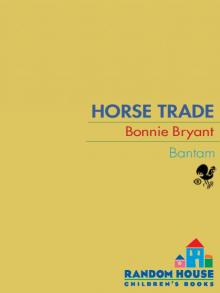 Horse Trade
Horse Trade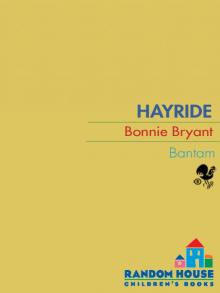 Hayride
Hayride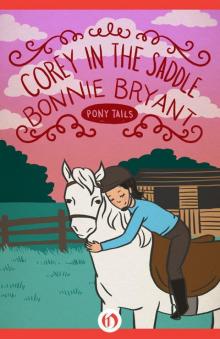 Pony Tails 06- Corey in the Saddle
Pony Tails 06- Corey in the Saddle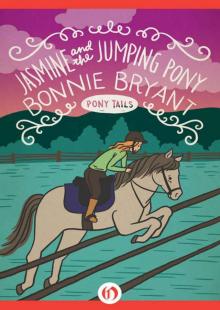 Jasmine and the Jumping Pony (Pony Tails Book 16)
Jasmine and the Jumping Pony (Pony Tails Book 16)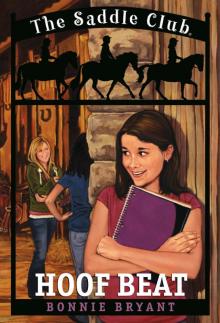 Hoof Beat
Hoof Beat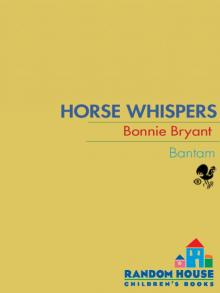 Horse Whispers
Horse Whispers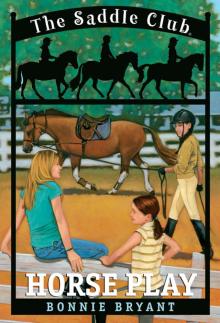 Horse Play
Horse Play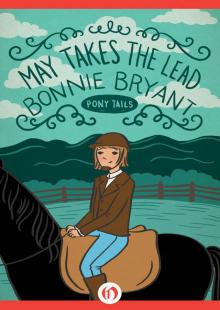 Pony Tails 05- May Takes the Lead
Pony Tails 05- May Takes the Lead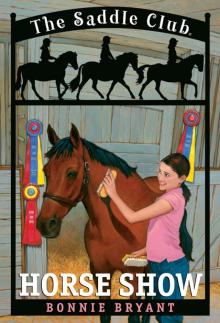 Horse Show
Horse Show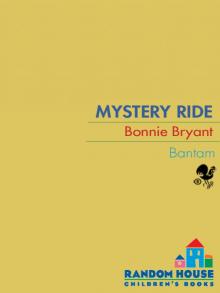 Mystery Ride
Mystery Ride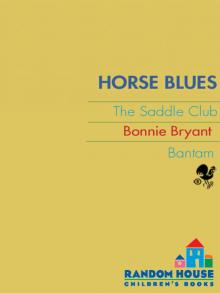 Horse Blues
Horse Blues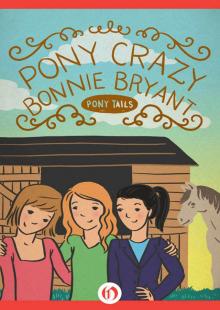 Pony Tails 01- Pony Crazy
Pony Tails 01- Pony Crazy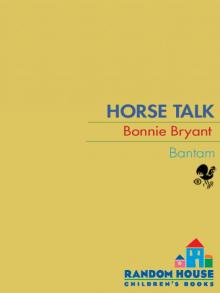 Horse Talk
Horse Talk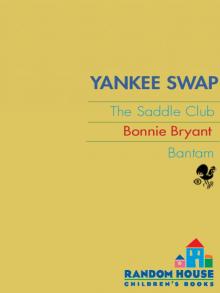 Yankee Swap
Yankee Swap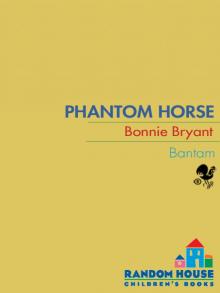 Phantom Horse
Phantom Horse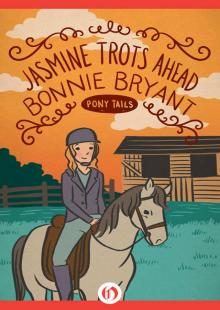 Pony Tails 07- Jasmine Trots Ahead
Pony Tails 07- Jasmine Trots Ahead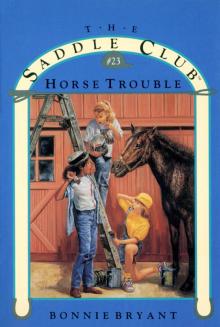 Horse Trouble
Horse Trouble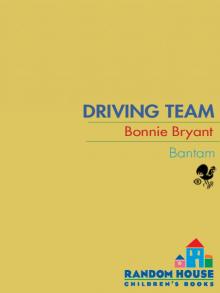 Driving Team
Driving Team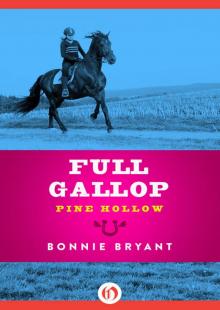 Full Gallop
Full Gallop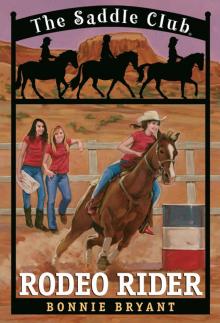 Rodeo Rider
Rodeo Rider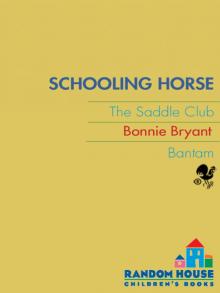 Schooling Horse
Schooling Horse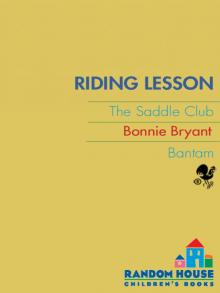 Riding Lesson
Riding Lesson Million-Dollar Horse
Million-Dollar Horse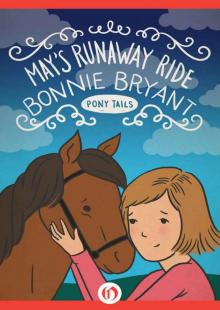 May's Runaway Ride (Pony Tails Book 14)
May's Runaway Ride (Pony Tails Book 14)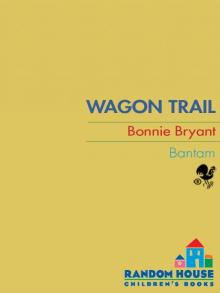 Wagon Trail
Wagon Trail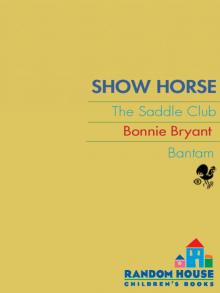 Show Horse
Show Horse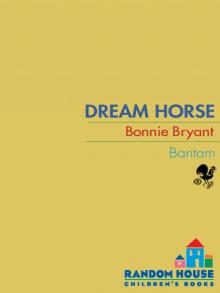 Dream Horse
Dream Horse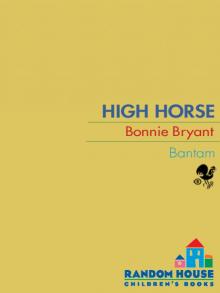 High Horse
High Horse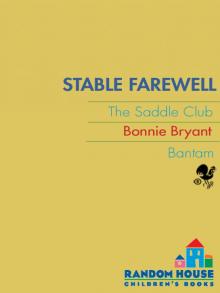 Stable Farewell
Stable Farewell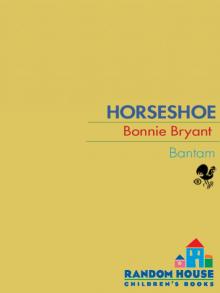 Horseshoe
Horseshoe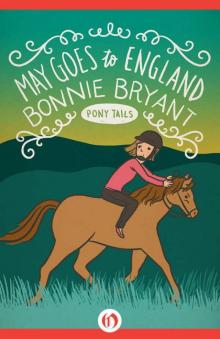 May Goes to England (Pony Tails Book 11)
May Goes to England (Pony Tails Book 11)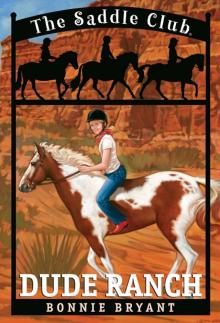 Dude Ranch
Dude Ranch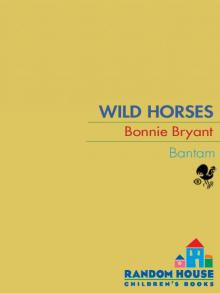 Wild Horse
Wild Horse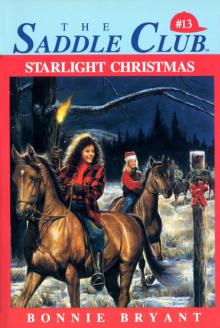 Starlight Christmas
Starlight Christmas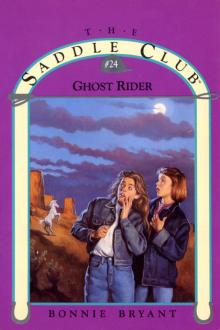 Ghost Rider
Ghost Rider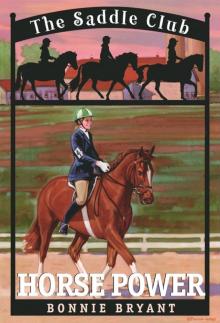 Horse Power
Horse Power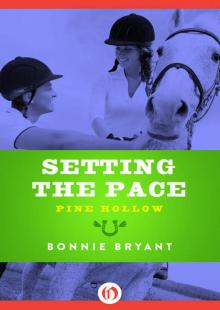 Setting the Pace
Setting the Pace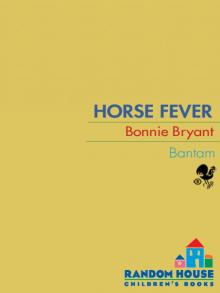 Horse Fever
Horse Fever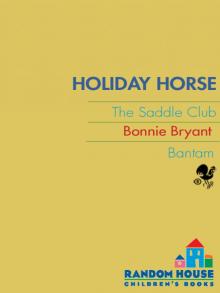 Holiday Horse
Holiday Horse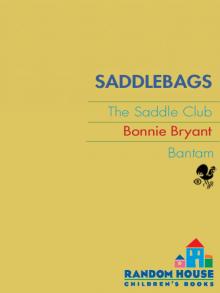 Saddlebags
Saddlebags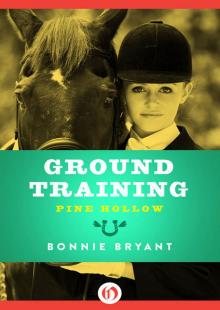 Ground Training
Ground Training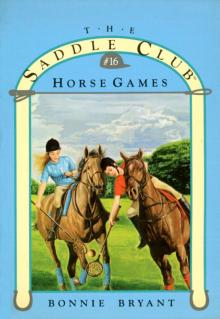 Horse Games
Horse Games Endurance Ride
Endurance Ride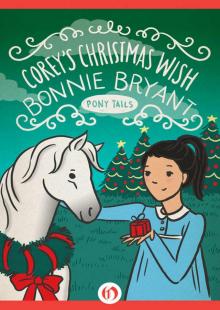 Pony Tails 15- Corey's Christmas Wish
Pony Tails 15- Corey's Christmas Wish Christmas Treasure
Christmas Treasure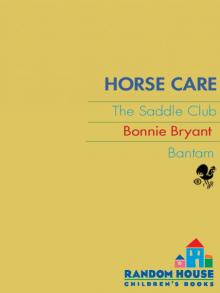 Horse Care
Horse Care Stagecoach
Stagecoach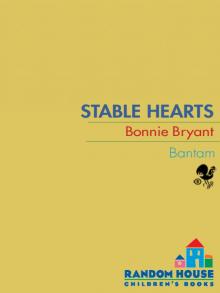 Stable Hearts
Stable Hearts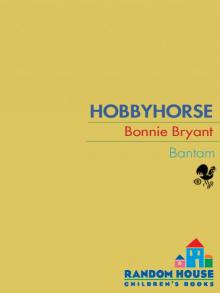 Hobbyhorse
Hobbyhorse Penalty Points
Penalty Points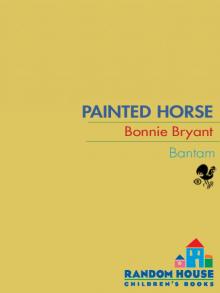 The Painted Horse
The Painted Horse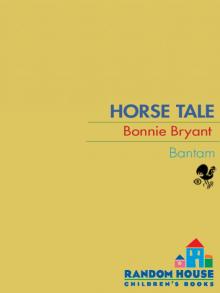 Horse Tale
Horse Tale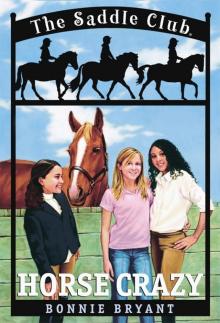 Horse Crazy
Horse Crazy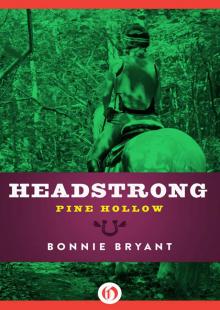 Headstrong
Headstrong English Rider
English Rider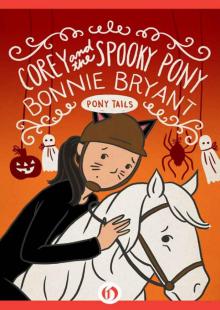 Corey and the Spooky Pony (Pony Tails Book 9)
Corey and the Spooky Pony (Pony Tails Book 9)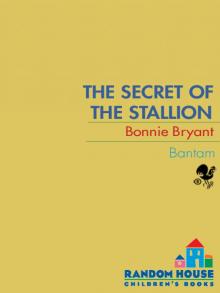 Secret of the Stallion
Secret of the Stallion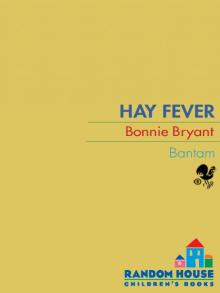 Hay Fever
Hay Fever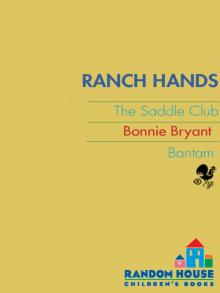 Ranch Hands
Ranch Hands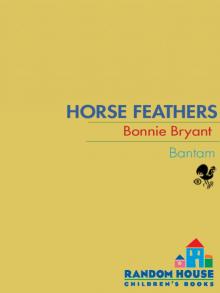 Horse Feathers
Horse Feathers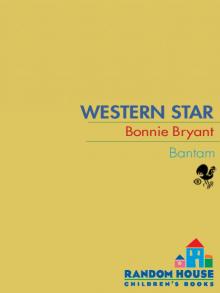 Western Star
Western Star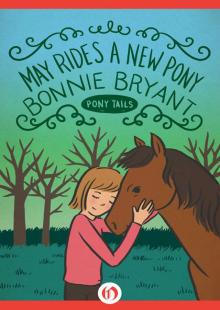 Pony Tails 08- May Rides a New Pony
Pony Tails 08- May Rides a New Pony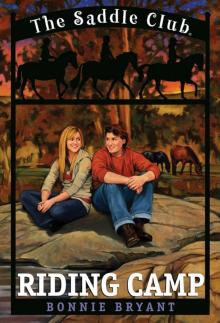 Riding Camp
Riding Camp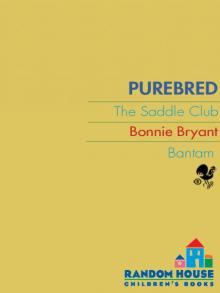 Purebred
Purebred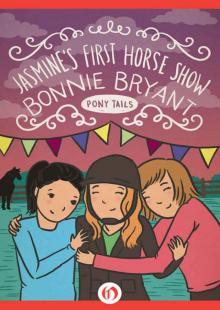 Jasmine's First Horse Show (Pony Tails Book 13)
Jasmine's First Horse Show (Pony Tails Book 13)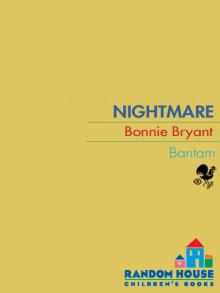 Nightmare
Nightmare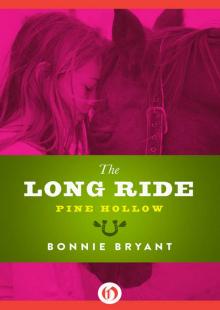 The Long Ride
The Long Ride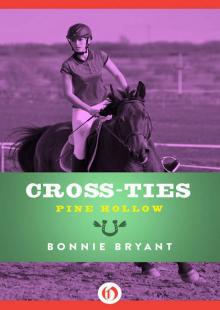 Cross-Ties
Cross-Ties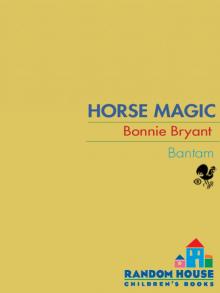 Horse Magic
Horse Magic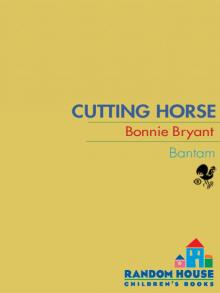 Cutting Horse
Cutting Horse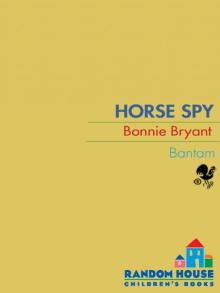 Horse Spy
Horse Spy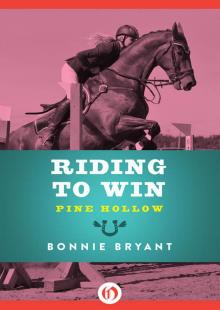 Riding to Win
Riding to Win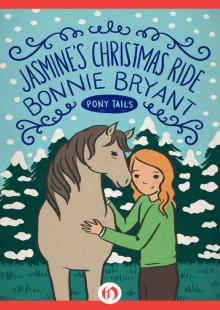 Pony Tails 04- Jasmine's Christmas Ride
Pony Tails 04- Jasmine's Christmas Ride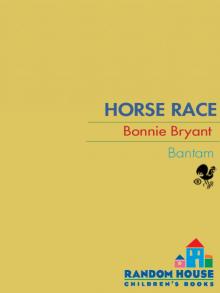 Horse Race
Horse Race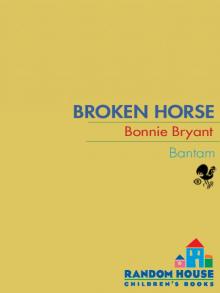 Broken Horse
Broken Horse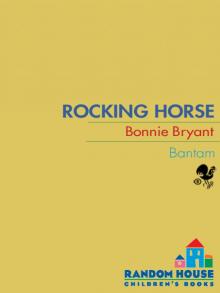 Rocking Horse
Rocking Horse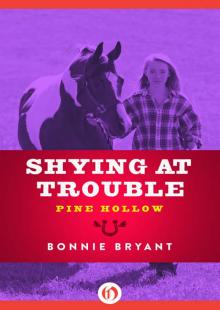 Shying at Trouble
Shying at Trouble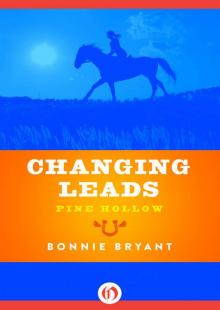 Changing Leads
Changing Leads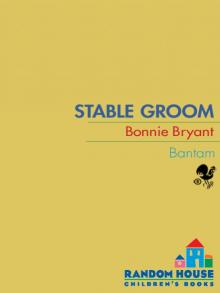 Stable Groom
Stable Groom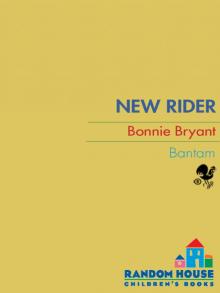 New Rider
New Rider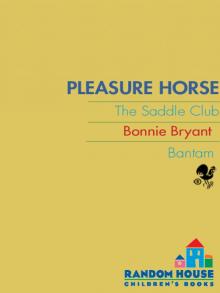 Pleasure Horse
Pleasure Horse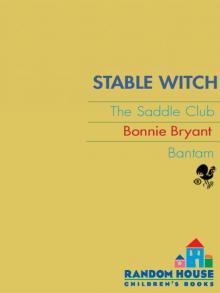 Stable Witch
Stable Witch Hard Hat
Hard Hat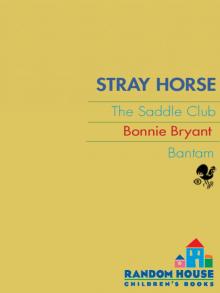 Stray Horse
Stray Horse High Stakes
High Stakes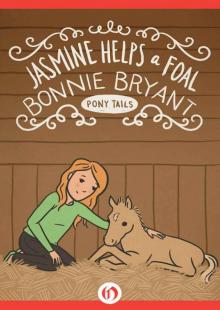 Jasmine Helps a Foal (Pony Tails Book 10)
Jasmine Helps a Foal (Pony Tails Book 10) English Horse
English Horse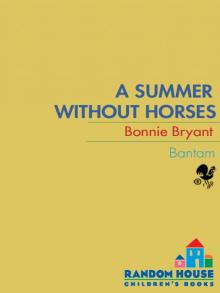 A Summer Without Horses
A Summer Without Horses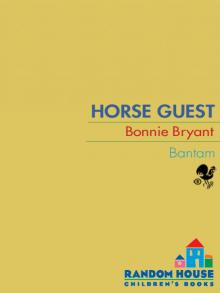 Horse Guest
Horse Guest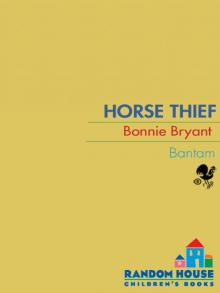 Horse Thief
Horse Thief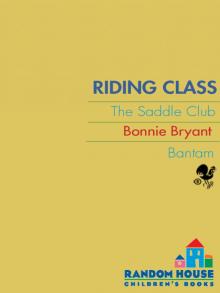 Riding Class
Riding Class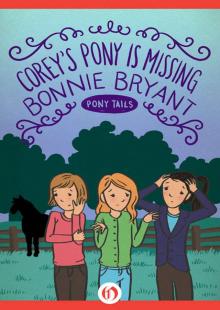 Pony Tails 03- Corey's Pony Is Missing
Pony Tails 03- Corey's Pony Is Missing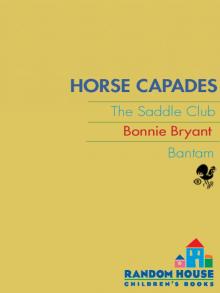 Horse Capades
Horse Capades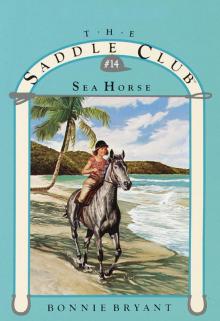 Sea Horse
Sea Horse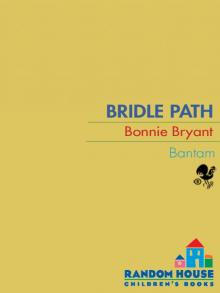 Bridle Path
Bridle Path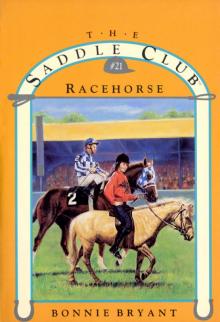 Racehorse
Racehorse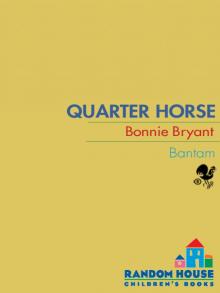 Quarter Horse
Quarter Horse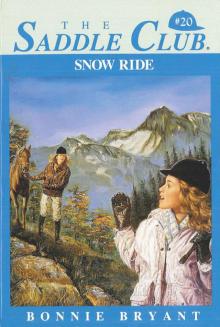 Snow Ride
Snow Ride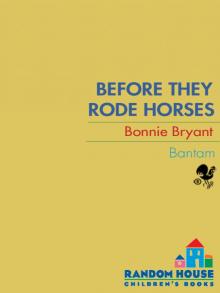 Before They Rode Horses
Before They Rode Horses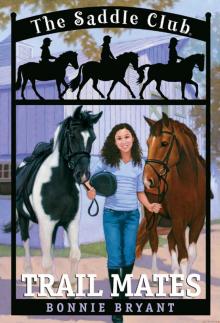 Trail Mates
Trail Mates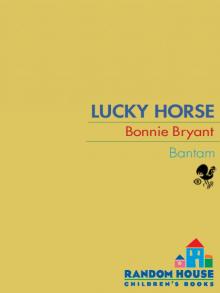 Lucky Horse
Lucky Horse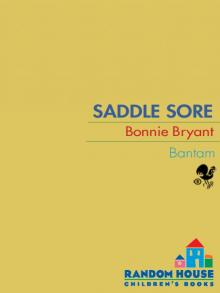 Saddle Sore
Saddle Sore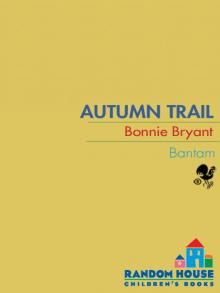 Autumn Trail
Autumn Trail Lisa
Lisa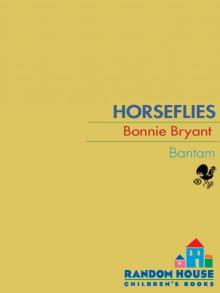 Horseflies
Horseflies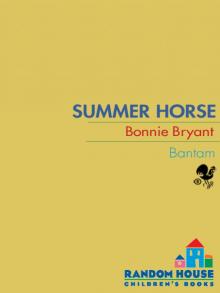 Summer Horse
Summer Horse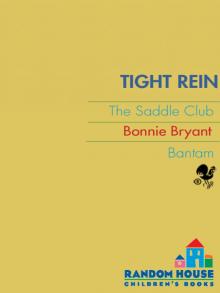 Tight Rein
Tight Rein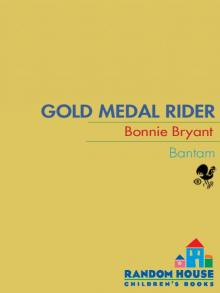 Gold Medal Rider
Gold Medal Rider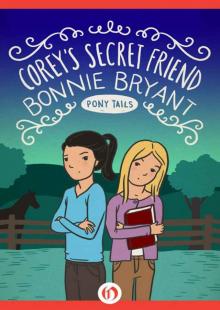 Corey's Secret Friend (Pony Tails Book 12)
Corey's Secret Friend (Pony Tails Book 12)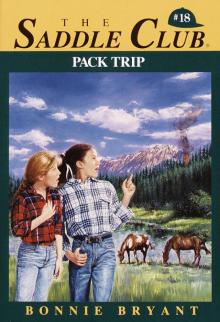 Pack Trip
Pack Trip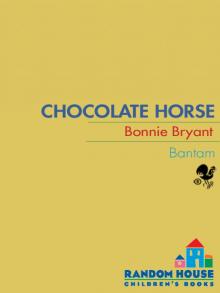 Chocolate Horse
Chocolate Horse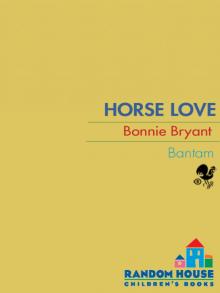 Horse Love
Horse Love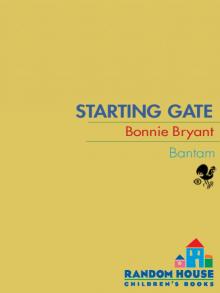 Starting Gate
Starting Gate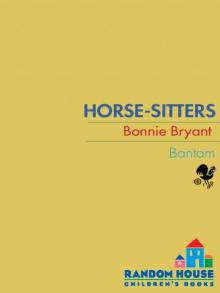 Horse-Sitters
Horse-Sitters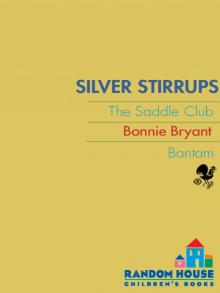 Silver Stirrups
Silver Stirrups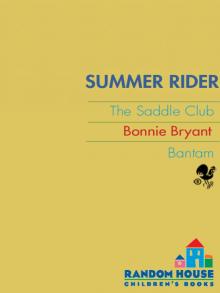 Summer Rider
Summer Rider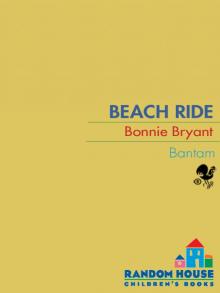 Beach Ride
Beach Ride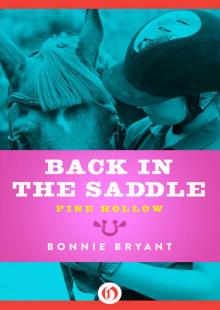 Back in the Saddle
Back in the Saddle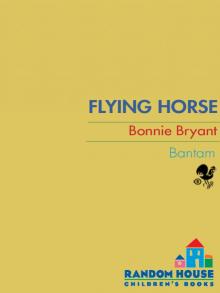 Flying Horse
Flying Horse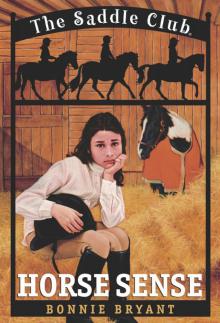 Horse Sense
Horse Sense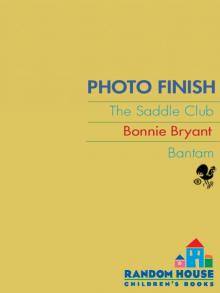 Photo Finish
Photo Finish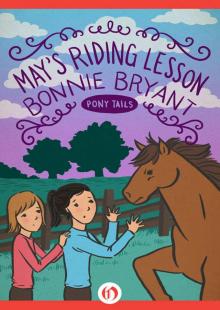 Pony Tails 02- May's Riding Lesson
Pony Tails 02- May's Riding Lesson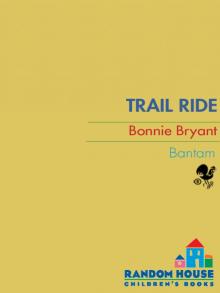 Trail Ride
Trail Ride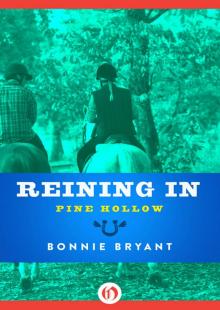 Reining In
Reining In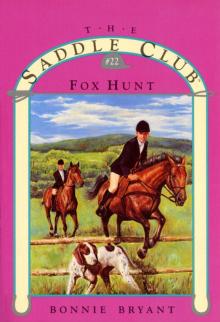 The Fox Hunt
The Fox Hunt Show Judge
Show Judge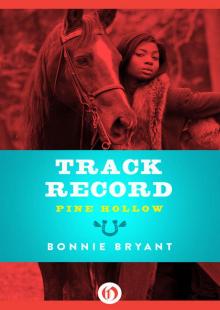 Track Record
Track Record Star Rider
Star Rider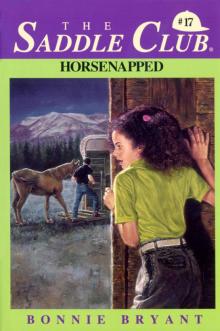 Horsenapped!
Horsenapped!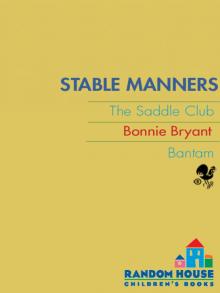 Stable Manners
Stable Manners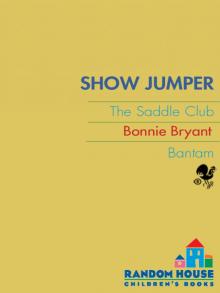 Show Jumper
Show Jumper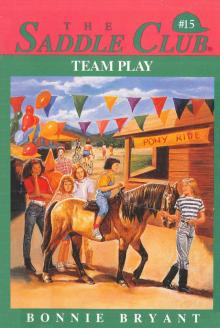 Team Play
Team Play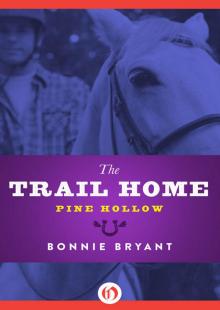 The Trail Home
The Trail Home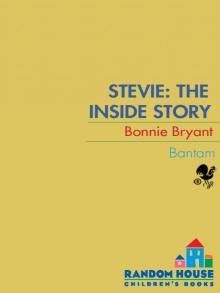 Stevie
Stevie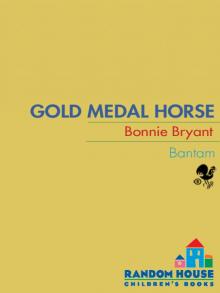 Gold Medal Horse
Gold Medal Horse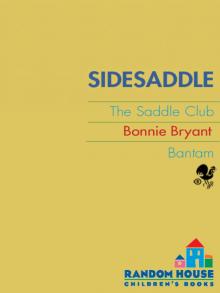 Sidesaddle
Sidesaddle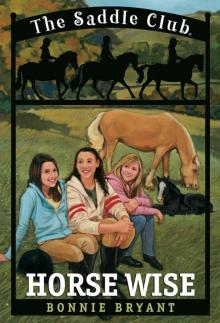 Horse Wise
Horse Wise Course of Action
Course of Action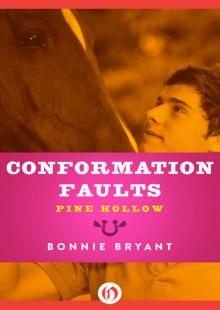 Conformation Faults
Conformation Faults